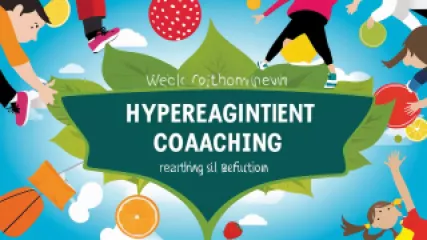Top Strategies for Managing Hyperactivity in Wellness Coaching
Top Strategies for Managing Hyperactivity in Wellness Coaching
Hyperactivity can be a significant challenge for both individuals and wellness coaches. It can impact an individual's ability to focus, regulate their emotions, and maintain a healthy lifestyle. However, with the right strategies and support, it is possible to manage hyperactivity and achieve greater well-being. In this research summary, we will explore the key strategies that wellness coaches can utilize to help their clients effectively manage hyperactivity.
Understanding Hyperactivity
Hyperactivity is a complex condition that can manifest in various ways, including restlessness, impulsivity, and difficulty concentrating. It is often associated with attention-deficit/hyperactivity disorder (ADHD), but it can also occur independently or as a result of other underlying factors, such as stress, trauma, or medical conditions.
Wellness coaches play a crucial role in supporting individuals with hyperactivity, as they are uniquely positioned to address the multifaceted nature of this condition. By employing a holistic approach that encompasses physical, mental, and emotional well-being, wellness coaches can help clients develop strategies to manage hyperactivity and improve their overall quality of life.
Strategies for Managing Hyperactivity
1. Establishing a Structured Routine
One of the foundational strategies for managing hyperactivity is the implementation of a structured daily routine. Predictable schedules and consistent patterns can help individuals with hyperactivity feel more grounded and in control, reducing feelings of overwhelm and impulsivity.
Wellness coaches can work with their clients to create a personalized routine that incorporates regular sleep patterns, mealtimes, physical activity, and time for relaxation and mindfulness practices. By establishing a sense of predictability and control, clients can better regulate their energy levels and focus their attention on the tasks at hand.
2. Incorporating Physical Activity
Regular physical activity is a powerful tool for managing hyperactivity. Exercise not only helps release excess energy but also promotes the production of neurotransmitters like dopamine and serotonin, which can improve mood, focus, and impulse control.
Wellness coaches can encourage their clients to engage in a variety of physical activities, such as aerobic exercises, strength training, or outdoor activities like hiking or swimming. By finding enjoyable and sustainable physical outlets, clients can channel their energy in a positive way and develop healthier coping mechanisms for managing hyperactivity.
3. Implementing Mindfulness and Stress Management Techniques
Hyperactivity is often exacerbated by stress and anxiety, which can further disrupt emotional regulation and cognitive functioning. Wellness coaches can introduce their clients to mindfulness and stress management techniques to help them better manage their hyperactive tendencies.
Practices such as meditation, deep breathing exercises, and body-based awareness exercises can help clients develop greater self-awareness and the ability to recognize and respond to their hyperactive impulses in a more constructive manner. Additionally, wellness coaches can guide clients in exploring relaxation techniques, such as progressive muscle relaxation or guided imagery, to help them find moments of calm and restore their inner balance.
4. Fostering Cognitive-Behavioral Strategies
Cognitive-behavioral strategies can be highly effective in managing hyperactivity by helping individuals recognize and modify their thought patterns and behaviors. Wellness coaches can work with their clients to identify triggers, develop coping mechanisms, and cultivate more adaptive thought processes.
Techniques such as cognitive reframing, goal setting, and problem-solving can empower clients to take a more proactive approach to managing their hyperactivity. By shifting their mindset and developing practical skills, clients can learn to navigate challenging situations with greater self-awareness and emotional regulation.
5. Addressing Nutritional and Lifestyle Factors
Diet and lifestyle choices can have a significant impact on hyperactivity. Wellness coaches can work with their clients to explore the potential role of nutrition, sleep, and other lifestyle factors in managing hyperactive tendencies.
For example, clients may benefit from a balanced diet rich in whole foods, healthy fats, and complex carbohydrates, which can help regulate blood sugar levels and support cognitive function. Ensuring adequate sleep and avoiding stimulants like caffeine or sugar can also be beneficial. Additionally, wellness coaches can guide clients in incorporating relaxation techniques, such as yoga or deep breathing, to promote better sleep and overall well-being.
6. Fostering Self-Awareness and Self-Regulation
Ultimately, the most effective strategies for managing hyperactivity involve empowering clients to develop greater self-awareness and self-regulation skills. Wellness coaches can guide their clients in exploring their unique hyperactive patterns, triggers, and coping mechanisms, and then support them in cultivating the skills to manage their hyperactivity more effectively.
This may include teaching clients to recognize the early signs of hyperactivity, develop strategies for redirecting their energy, and learn to communicate their needs to others. By nurturing these self-management abilities, wellness coaches can help their clients gain a sense of control and autonomy in their journey towards better well-being.
Conclusion
Managing hyperactivity is a multifaceted challenge, but with the right strategies and support, individuals can learn to navigate their hyperactive tendencies and achieve greater well-being. Wellness coaches play a crucial role in this process, leveraging their holistic approach to address the physical, mental, and emotional aspects of hyperactivity.
By implementing structured routines, incorporating physical activity, practicing mindfulness and stress management, fostering cognitive-behavioral strategies, addressing nutritional and lifestyle factors, and cultivating self-awareness and self-regulation, wellness coaches can empower their clients to effectively manage hyperactivity and unlock their full potential. Through this comprehensive approach, individuals can develop the skills and resilience needed to thrive, both personally and professionally.
About the Author
Virgil Little is a certified wellness coach with over a decade of experience supporting individuals in managing a variety of health and well-being challenges, including hyperactivity. Virgil's approach is grounded in the latest research and a deep understanding of the multifaceted nature of human health. He is passionate about empowering his clients to achieve their goals and live their best lives.






